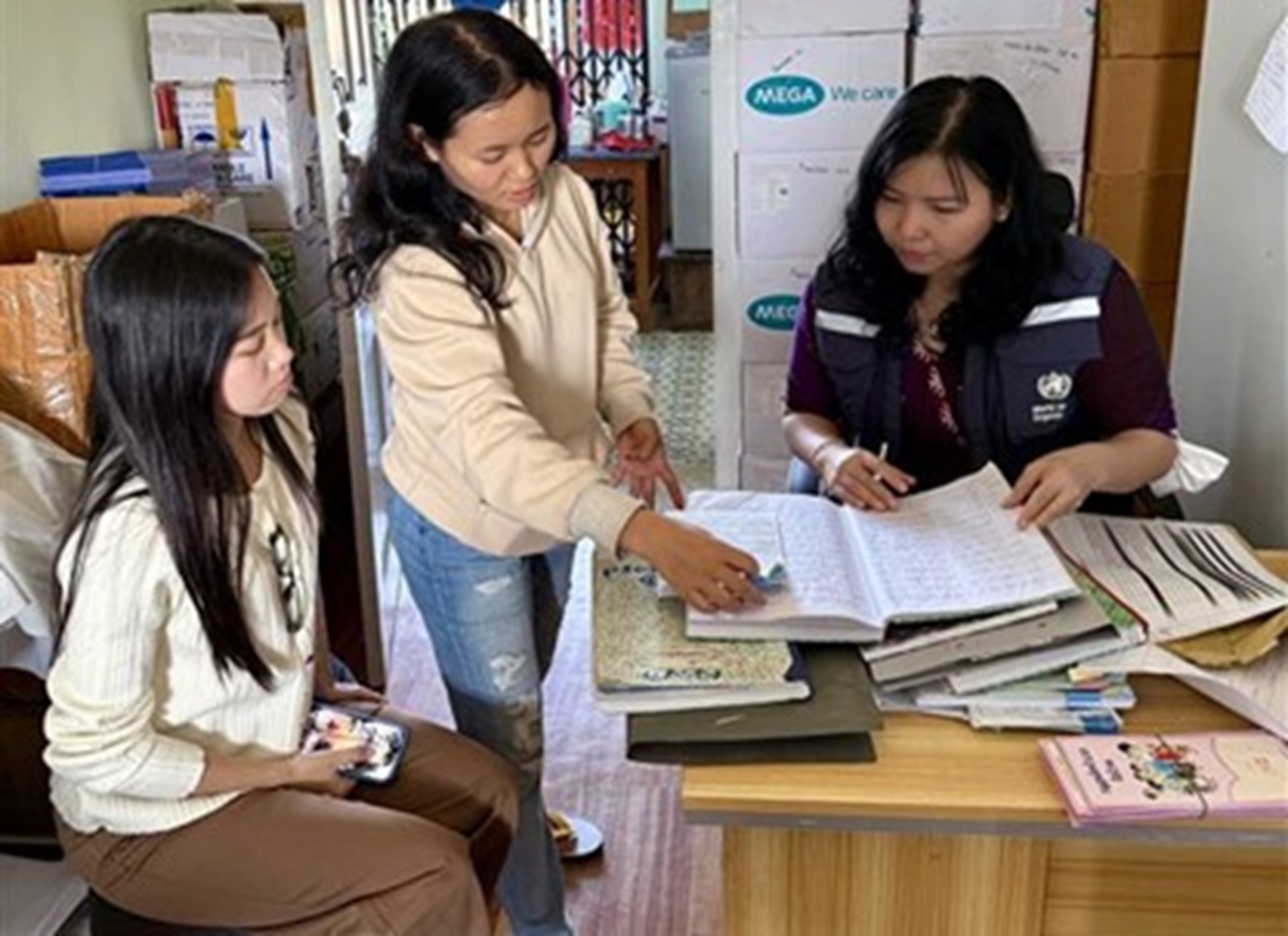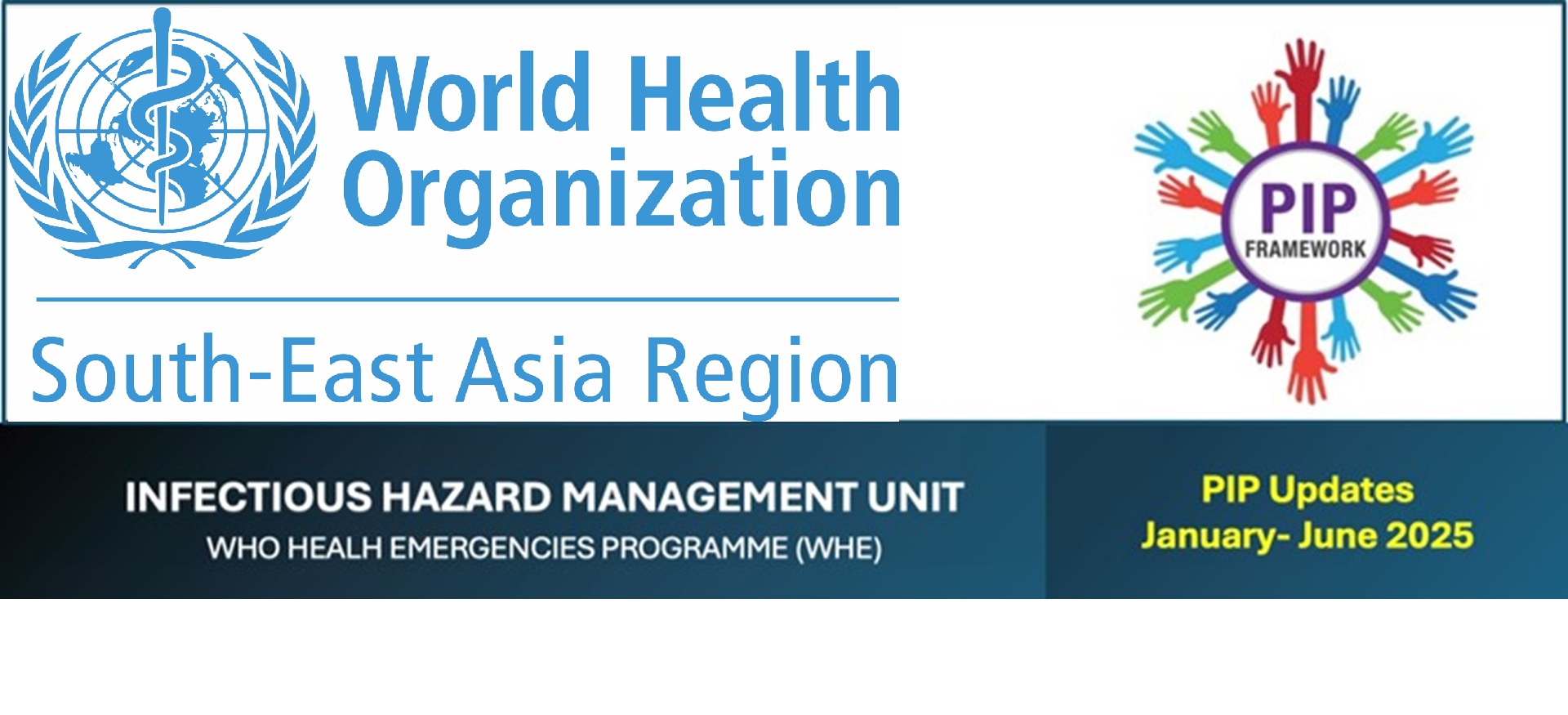IN THE SPOTLIGHT
STRENGTHENING INFLUENZA PANDEMIC PREPAREDNESS THROUGH A RESILIENT EARLY WARNING SYSTEM IN CONFLICT-AFFECTED AREAS OF MYANMAR

In a country experiencing a dynamic and challenging situation, safeguarding public health requires innovative solutions. As a testimony to such solutions, WHO Country Office in Myanmar, in collaboration with health partners and with financial support from the Pandemic Influenza. Preparedness Partnership Contribution (PC) implemented an Early Warning Alert and Response System (EWARS) as a supplementary surveillance system in conflict-affected areas such as Kachin and Rakhine states. This system plays a vital role in strengthening pandemic preparedness within such a complex setting.
A COLLABORATIVE APPROACH TO STRENGTHENING PANDEMIC PREPAREDNESS IN SOUTH-EAST ASIA
The National Influenza Pandemic Preparedness Plans (NIPPPs) form the backbone of a country’s planning and preparedness for, and response to, influenza pandemics. They also serve as a foundation for the rapid adaptation of responses to other respiratory pathogens with pandemic potential. During the period of implementation of the Pandemic Influenza Preparedness (PIP) Partnership Contribution (PC) High Level Implementation Plan II (HLIP-II) (2018-23), all countries in the WHO’s Southeast Asia Region developed or updated their NIPPPs. Most of these countries are now actively engaged in developing broad respiratory pathogen pandemic plans using the WHO’s Preparedness and Resilience for Emerging Threats (PRET) approach. Supported by global partnerships and frameworks, these efforts aim to enhance preparedness and resilience against future pandemics by integrating lessons from past outbreaks and aligning with regional and global health security strategies.
OPERATIONAL PLANNING INITIATED FOR PANDEMIC INFLUENZA PREPAREDNESS PARTNERSHIP CONTRIBUTION WORKPLANS FOR 2026-27 BIENNIUM IN SEAR
On 28 April 2025, WHO Regional Office for the South-East Asia (SEARO), in collaboration with WHO Headquarters, convened a virtual planning meeting with focal points from all WHO country offices in the region (except Thailand) that directly receive support through the Pandemic Influenza Preparedness (PIP) Partnership Contributions (PC). As part of the ongoing PIP PC operational planning for the 2026-27 biennium, the meeting provided an overview of key global priorities under each of the six deliverables for Outputs 1 and 2 of the PIP PC High-Level Implementation Plan 2024–2030 (HLIP III). Convening such a meeting to discuss and align global, regional, and national priorities was particularly vital in the current financial landscape, given the need to sustain core influenza surveillance and pandemic preparedness functions. Based on the priorities discussed, the WHO Country Offices finalized and submitted their draft work plans to the regional office. These plans were consolidated and shared with the PIP Secretariat/HQ for review. Through such coordinated planning efforts, SEARO continues to strengthen pandemic influenza preparedness and contribute to a more resilient global health emergency architecture.
ADVANCING INFLUENZA SURVEILLANCE IN SOUTHEAST ASIA: WHO - SEARO SUPPORTS ANTIVIRAL RESISTANCE TESTING TRAINING FOR THAILAND’S NATIONAL INFLUENZA CENTRE AT THE WHO COLLABORATING CENTRE IN AUSTRALIA
From 10–14 March 2025, WHO SEARO supported a hands-on training programme at the WHO Collaborating Centre for Reference and Research on Influenza in Melbourne, Australia, to enhance Thailand’s National Influenza Centre’s (NIC) expertise in antiviral resistance testing. The laboratory technicians mastered advanced techniques—including neuraminidase inhibition (NAI) assays and the Influenza Replication Inhibition Neuraminidase-based Assay (IRINA)—and gained practical experience in identifying genetic markers of antiviral resistance, such as Neuraminidase (NA) and Polymerase acidic protein (PA) substitutions. Participants also learned to use FluSurver, an analytical tool for mutation detection, and toured state-of-the-art laboratory facilities. This training enables Thailand to detect drug-resistant influenza strains more effectively and strengthen South-East Asia regional surveillance capacity.
STRENGTHENING SEASONAL INFLUENZA PREPAREDNESS IN DEMOCRATIC PEOPLES REPUBLIC OF KOREA: WHO SUPPORTS NATIONAL TRAINING ON SEASONAL INFLUENZA VACCINE INTRODUCTION
In October 2024, as part of ongoing efforts to strengthen influenza vaccination initiatives in the WHO South-East Asia Region, the World Health Organization (WHO), through its Regional Office for South-East Asia (SEARO) and the WHO Country Office for the Democratic People’s Republic of Korea (DPR Korea), facilitated a key national training session. This initiative, a part of the Pandemic Influenza Preparedness Partnership Contribution, was built on DPR Korea’s 2022 vaccine introduction and its updated National Pandemic Influenza Preparedness Plan in 2019. The training equipped national and sub-national health professionals—including National Immunization Technical Advisory Group (NITAG) members and frontline doctors—with practical tools in epidemiology, vaccine policy, antiviral use, and monitoring. Participants appreciated the hands-on modules and accompanying resource toolkit, which included WHO guidance, communication templates, and surveillance checklists. As a result, 426 county-level officials and 2,130 frontline health workers are now better prepared to drive sustainable influenza vaccination programmes and strengthen pandemic readiness.
OTHER KEY PIP UPDATES (JAN-JUN 2025)
NETWORKS AND TECHNICAL PARTNERSHIPS
WHO FACILITATES INTERACTION AMONG NATIONAL INFLUENZA CENTRES (NICs) IN THE SOUTH-EAST ASIA REGION, WHO COLLABORATING CENTRES (WHO CCs) FOR REFERENCE AND RESEARCH ON INFLUENZA, AND THE WHO GLOBAL INFLUENZA PROGRAMME THROUGH A REGIONAL WEBINAR
On 4, April 2025, WHO SEARO held a regional webinar to enhance collaboration between National Influenza Centres (NICs) in Southeast Asia and WHO Collaborating Centres (WHO CCs) in Australia and Japan in the Global Influenza Surveillance and Response System (GISRS). The webinar featured expert insights from both regional and global influenza experts, covering topics such as virus detection, characterization, and data-sharing for vaccine strain selection. Discussions with NIC representatives , including India's National Institute of Virology team, highlighted best practices and identified actionable steps—such as quarterly coordination calls, virus-sharing support, and External Quality Assessment — to bolster influenza preparedness across the region. Read more
STRENGTHENING SPECIMEN MANAGEMENT FOR INFLUENZA SURVEILLANCE: AN INFORMATION SHARING SESSION
On 29 April 2025, WHO SEARO hosted a technical information session focused on strengthening specimen management practices for influenza surveillance. The session organized as a follow- up to key action points from a recent regional webinar involving national influenza centres (NIC) and WHO Collaborating Centres, brought together member states, laboratories and partners to promote best practices in specimen collection, handling, and shipping. Emphasis was placed on how quality specimen management directly influences public health actions from vaccine strain selection to the global risk assessment. WHO also reaffirmed its commitment to supporting Member States through logistical support and capacity-building programmes such as Infectious Substances Shipping Training (ISST). Read more.
UPCOMING MEETINGS AND EVENTS
- Virtual Meeting: 18th Bi-regional Meeting of the National Influenza Centres (NICs) and Influenza in WHO's South-East Asia and Western Pacific Region 2025
- Hybrid Meeting: Annual regional meeting on review of Pandemic Influenza Preparedness (PIP) Partnership Contributions (PC) implementation and consultation on proposed regional roadmap and action framework on Preparedness and Resilience for Emerging Threats (PRET) in Southeast Asia Region 2025
CONTACT US
For more information, please contact:
Dr Pushpa Ranjan Wijesinghe
Programme Area Manager (PAM)
Infectious Hazard Management (IHM)
wijesinghep@who.int
WHO Health Emergencies Programme
WHO Regional Office for South-East Asia

